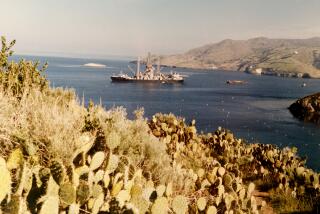Botching Up in Nicaragua
- Share via
There were always sound legal and ethical reasons why the Reagan Administration should not have embarked on its covert war against Nicaragua four years ago. Now it is clear that there were also practical reasons why that course of action was a serious mistake.
In a series of articles published this week, Times staff writers Doyle McManus and Robert C. Toth reported how the Central Intelligence Agency’s secret war against Nicaragua was planned, carried out and eventually run aground. They detailed a policy failure whose immediate cause was a series of deceits and self-delusions, but that ultimately stemmed from a stubbornly ideological view of the turmoil in Central America.
President Reagan decided to attack Nicaragua because he could not bear the thought of a Marxist revolution consolidating itself in the United States’ “backyard.” His world view blinded him from seeing that the Nicaraguan revolution posed no serious strategic threat to the United States. He also never seriously considered the possibility that the Sandinistas could be nudged toward moderation by U.S. allies in Latin America such as Mexico and Venezuela, which had helped the Sandinistas win their revolution.
So the question for Reagan and his aides was not whether the Sandinistas should be pressured, but how to do it. Realizing that they did not have the public support for a direct military confrontation, Administration officials chose covert action. The CIA was ordered to raise a secret army of anti-Sandinista rebels who came to be known as contras. Officially, the covert war was explained as an effort to stop Nicaraguan arms from reaching leftist rebels in El Salvador. But the Administration’s real goal, which was ardently hoped for but rarely stated aloud, was to overthrow the Sandinistas.
Again ideological blindness kept Administration officials from realizing at the very start, in 1981, that there was little chance for the secret war to be successful. It was too big to control. It was too big to remain secret. There were too many squabbling rebel factions to unite. The CIA’S troops included too many supporters of ousted Nicaraguan dictator Anastasio Somoza to make the contras look respectable, much less democratic. Most important, there was not enough discontent with the Sandinistas inside Nicaragua to support a counterrevolution.
As the contras’ shortcomings became obvious, the Administration grew frustrated and impatient. Inexorably, the U.S. role in the war against Nicaragua grew larger and more pivotal. By late 1983 CIA operatives were directly involved in sabotage attacks against Nicaragua in direct violation of U.S law.
Finally a violation of international law, the CIA’s mining of Nicaragua’s harbors in early 1984, brought the sordid campaign to a temporary end. The mines were manufactured and laid by CIA employees, and even the highest contra leaders did not learn about them until after the fact. But those leaders were in good company; key members of Congress were also kept ignorant of the mining campaign until it was too late to stop it. When details leaked out, Congress temporarily halted all financial support for the covert war .
Congress will have to vote again soon over whether to renew funding for the contras , and the Administration has mounted an aggressive public-relations campaign in favor of doing so. But Congress must not be stampeded by Reagan’s emotional rhetoric. The covert war against Nicaragua must be ended once and for all.
Once that is done, the Administration will be forced to find more constructive ways to deal with the Sandinistas. The best option would be for this country to allow the Contadora Group--Mexico, Venezuela, Colombia and Panama--to take the lead in Central America. The group should be allowed to move forward, without U.S. interference, with their long effort to arrange a peace treaty between Nicaragua and the four other nations in the region. The Contadora nations could then be encouraged to use their moral authority, and their economic clout, to pressure the Sandinistas to curb their Marxist zeal and allow more freedom in Nicaragua.
More to Read
Sign up for Essential California
The most important California stories and recommendations in your inbox every morning.
You may occasionally receive promotional content from the Los Angeles Times.









